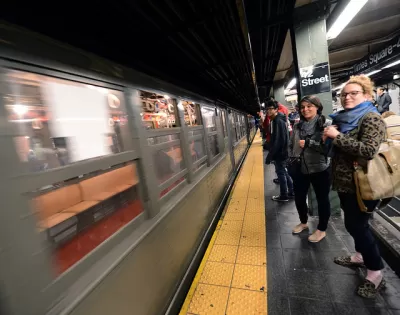Congress passed a $1.1 trillion omnibus spending bill to keep the government operating through September that also restores funding to transportation programs that the president had eliminated or greatly reduced. Trump signed the bill Friday.

[Updated May 9, 2017] The fiscal 2017 omnibus spending bill provides $19.3 billion for the U.S. Department of Transportation (DOT), which President Trump would have cut by 13 percent or $2.4 billion, reports Melanie Zanona for The Hill. Trump had proposed:
- Eliminating funding for the Transportation Investment Generating Economic Recovery (TIGER) grant program
- Limiting funding for the Federal Transit Administration's Capital Investment Grant Program only to those projects already locked in with formal federal commitments, known as ''full funding grant agreements."
The 2017 omnibus bill includes a new round of $500 million in TIGER grants, reports AASHTO Journal, and adds $126 million to the FTA grant program.
One project that hopes to benefit from the additional funding in the transit grants program is Caltrain electrification between San Francisco and San Jose. The budget bill includes $100 million for the project, reports Samantha Weigel for The (San Mateo) Daily Journal.
It’s good progress,” said Caltrain Chief Communications Officer Seamus Murphy. “We just need two things to happen for that $100 million to be accessible to us, one is to get the full funding grant agreement signed and two is for the legislation the bill to be approved by Congress and signed by the president.”
The latter was done on Friday, but the $2 billion question, the total cost of the project, hinges on Chao's signature to access the $647 million grant as well as the $100 million in omnibus.
The embattled project may ultimately be derailed by Secretary of Transportation Elaine Chao's decision on Feb. 17 to defer signing a full funding grant agreement (FFGA), thereby denying the rail agency a $647 million core capacity improvement grant as well as the $100 million.
Somewhat similar to Caltrain is Maryland’s light-rail Purple Line, with $125 million designated provided Chao signs a FFGA, reports Faiz Siddiqui for The Washington Post. Unlike Caltrain, though, it has a looming legal problem it needs to resolve first.
Siddiqui also reports that D.C. Metro will receive $150 million in the omnibus bill, "but it’s unclear whether Congress will approve funding for the remainder of the 10-year, $1.5 billion federal program."
According to a House Appropriations summary (pdf) showing transportation, housing and urban development appropriations in the bill, "the bill provides $1.5 billion for Amtrak."
The bill adopts the new Amtrak funding structure as authorized, providing $328 million for Amtrak’s Northeast Corridor and $1.2 billion to support the National Network.
The NARP Hotline lays out the specific categories designated for Amtrak funding.
also provides an update for Transportation for America on how the omnibus may fund "the scores of projects expected to sign grant agreements this year, like planned bus rapid transit projects in Albuquerque, Indianapolis, Everett (WA), and Kansas City, among many others." See FTA Current Capital Investment Grant (CIG) Projects.
The House passed the bill on Wednesday and the Senate followed on Friday. President Trump signed the bill Friday afternoon while at his golf club in New Jersey.
Hat tip to L.A. Transportation Headlines.
[Headline updated with correct time period.]
FULL STORY: Congress saves transportation programs from Trump's proposed cuts

Planetizen Federal Action Tracker
A weekly monitor of how Trump’s orders and actions are impacting planners and planning in America.

Restaurant Patios Were a Pandemic Win — Why Were They so Hard to Keep?
Social distancing requirements and changes in travel patterns prompted cities to pilot new uses for street and sidewalk space. Then it got complicated.

Map: Where Senate Republicans Want to Sell Your Public Lands
For public land advocates, the Senate Republicans’ proposal to sell millions of acres of public land in the West is “the biggest fight of their careers.”

Maui's Vacation Rental Debate Turns Ugly
Verbal attacks, misinformation campaigns and fistfights plague a high-stakes debate to convert thousands of vacation rentals into long-term housing.

San Francisco Suspends Traffic Calming Amidst Record Deaths
Citing “a challenging fiscal landscape,” the city will cease the program on the heels of 42 traffic deaths, including 24 pedestrians.

California Homeless Arrests, Citations Spike After Ruling
An investigation reveals that anti-homeless actions increased up to 500% after Grants Pass v. Johnson — even in cities claiming no policy change.
Urban Design for Planners 1: Software Tools
This six-course series explores essential urban design concepts using open source software and equips planners with the tools they need to participate fully in the urban design process.
Planning for Universal Design
Learn the tools for implementing Universal Design in planning regulations.
Heyer Gruel & Associates PA
JM Goldson LLC
Custer County Colorado
City of Camden Redevelopment Agency
City of Astoria
Transportation Research & Education Center (TREC) at Portland State University
Camden Redevelopment Agency
City of Claremont
Municipality of Princeton (NJ)




























